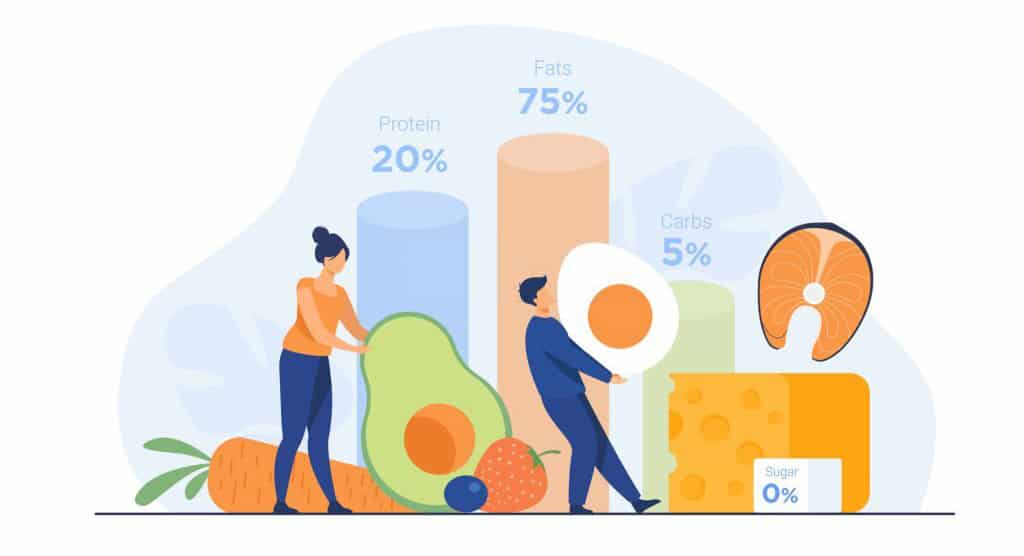It would take 20 articles to describe completely how low-carb eating can improve one’s health. The advantages of minimizing carbs in the diet span just about every aspect of human function.
Science proves that low-carb diets are more effective for weight loss, reducing disease risk factors, and improving overall health than any other nutrition plan studied.
The low-fat drum has been beaten way too long, given the lack of scientific evidence supporting it. It has become clear to many health authorities that removing healthy, natural fat sources from the human diet was a big mistake.
Current research shows that eating healthy fat doesn’t make a person fat or increase cholesterol levels in the blood (1). But once low-fat diet foods became a billion-dollar cash cow, the food and weight-loss industries made sure to keep howling about the “health benefits” of low-fat diets.
Science does not support their stance, however.
Low-Carb vs Low-Fat Diets for Weight Loss
Weight loss is the number one reason people change their eating habits, so let’s start there.
When we compared low-carb diets to low-fat diets for weight loss, the low-carb approach won every time.
Low-carb diets were more effective for weight loss:
- In both diabetic and non-diabetic subjects (2).
- In severely obese adults with diabetes or metabolic syndrome (3).
- When compared to Zone, Ornish, and LEARN diets (4).
- For overweight and severely obese adolescents (5)(6).
They were also better at reducing hunger (7) and resulted in significantly greater weight loss in less time (8)(9)(10)(11)(12) than low-fat diets.
It’s important to note that, in some of the above-referenced studies, researchers also commented on greater improvements in cholesterol levels, insulin sensitivity, triglyceride levels, and other heart disease risk factors in the low-carb groups.
One study looked at 17 different clinical investigations of obese patients and found that low-carb eating was effective in decreasing body weight, body mass index, abdominal circumference, systolic and diastolic blood pressure, triglycerides, fasting glucose, plasma insulin, and plasma C-reactive protein, and also increased HDL (good) cholesterol (13).
And since we’re comparing low-carb and low-fat diets, there are a few other research conclusions worth mentioning here, given that we’ve been told for 40 years that low-fat diets are healthy.
In this study which followed 48,835 post-menopausal women for over 8 years, the researchers concluded that a low-fat diet did not significantly lower the risks of heart disease, stroke, or cardiovascular disease.
This systematic review of 13 electronic databases focused on randomized controlled trials of low-carbohydrate diets compared with low-fat/low-calorie diets. The low-carb diet resulted in better outcomes with weight, cholesterol, triglycerides, and blood pressure.
The Effect of Low-Carb Diets on Type 2 Diabetes
Today’s health professionals highly misunderstand type 2 diabetes. Type 2 diabetes, high cholesterol, high blood pressure, insulin resistance, and metabolic syndrome are all rooted (in large part) in the diet.
The body breaks carbohydrates down into sugar (even if the box says “sugar-free”) which causes insulin levels to spike.
High blood sugar = high insulin = insulin resistance = diabetes.
The best way to reverse these issues is to restrict carbs (and sugar) in the diet, so blood sugar/insulin stays low.
- 2 studies demonstrated a better improvement in glucose and insulin levels with low-carb rather than low-fat diets (14)(15).
- 4 studies advocated low-carb diets specifically for the treatment of type 2 diabetes (16)(17)(18).
Research Conclusion: “Diabetes medications were discontinued or reduced in most participants.” (19)
- 4 studies showed low-carb diets lead to superior results over low-fat diets with regard to metabolic syndrome (20)(21)(22)(23).
- And contrary to popular advice, restricting calories to achieve weight loss does not improve type 2 diabetes (24).
Research Conclusion: “Recent studies have outlined LCD (Low-Carb Diet) metabolism and shown that LCDs improve glycemic control and insulin resistance in healthy persons and in persons with type 2 diabetes.
Without specific reference to calorie intake, the instruction to limit carbohydrate intake leads to a spontaneous reduction in calorie intake.
In controlled trials for weight loss, the LCD leads to weight loss and improvements in fasting triacylglycerols, HDL cholesterol, and the ratio of total to HDL cholesterol over a 6–12 month period.
Because of their glucose and insulin-lowering effects, LCDs should be evaluated as possible treatments for conditions related to hyperglycemia, hyperinsulinemia, and insulin resistance.” (25)
The Effect of Low-Carb Diets on Heart Health
Triglyceride levels are a major indicator of heart disease. They signify how much fat is present in the blood. High triglycerides are typically associated with excess carbohydrate consumption (26)(27) because the surplus is converted to triglycerides and stored as fat.
As a general rule, HDL cholesterol levels should be high while triglycerides remain low.
Low-carb diets have proven to be an effective means of lowering triglycerides. This makes perfect sense. If the body doesn’t have simple sugars to use for energy, it turns to fat. When the body is burning fat for energy, it isn’t storing it, so triglycerides stay low.
- In three studies, low-carb eating was associated with low triglycerides and improved cholesterol levels (28)(29)(30).
- While in this one, low-fat diets INCREASED triglycerides (31).
- Low-fat diets also increased LDL (bad) cholesterol (32) while limiting carbs improved cholesterol (33).
Research Conclusion: “The increase in high-density lipoprotein (HDL) cholesterol concentrations and the decrease in triglyceride concentrations were greater among subjects on the low-carbohydrate diet.” (34)
Carbohydrate Intake Recommendations for Weight Loss and Wellness
Understand that the following are general guidelines. Healthy carb intake varies according to activity level, age, overall wellness, and other factors.
The average American eats over 300 grams of carbohydrates per day, mostly in the form of processed foods like pasta, bread, cereal, bagels, snack bars, chips, and even yogurt and other seemingly “healthy” choices.
However, when carbohydrates come from real food (like fruits and vegetables), it’s quite difficult to exceed healthy carb limits.
Low-Carb Guidelines: To maintain weight, we should limit carbohydrates to between 100 and 150 grams per day. On the other hand, to lose weight, carb intake should be kept under 100 grams per day, with the majority coming from fruits, vegetables, and other real foods.
And for those attempting to affect a disease process like diabetes or insulin resistance, the ideal amount of carbs per day is 20 -50 grams. At 20-50 grams, most fruit would have to be eliminated, with the exception of some berries or another low-sugar variety.
If you are suffering from a chronic disease and are interested in transitioning to a low-carb diet, it’s important to find a health professional or dietitian who can guide and monitor you along the way.






